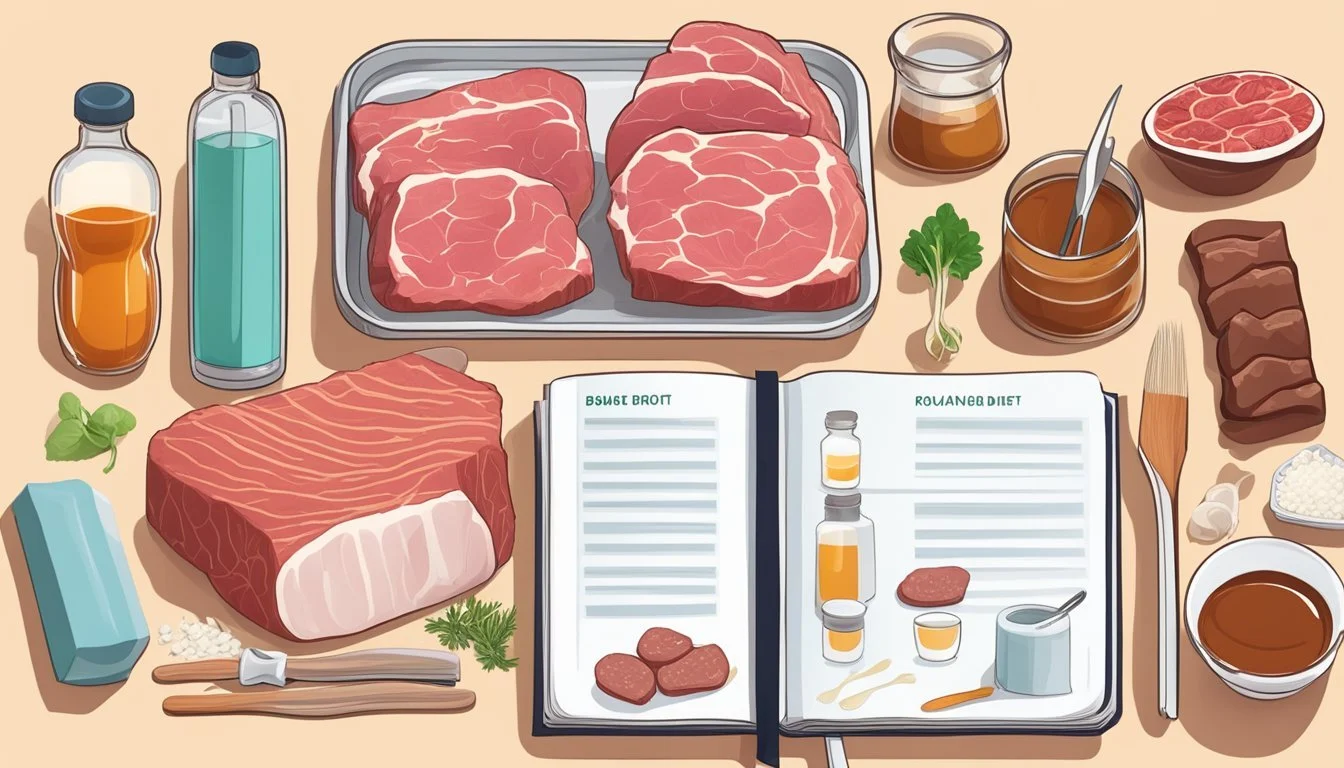Carnivore Diet and Oral Hygiene
Impacts and Practices to Maintain Dental Health
The carnivore diet, consisting predominantly of animal products such as meat, fish, eggs, and certain forms of dairy, has been gaining popularity as a food lifestyle choice. Advocates of this diet suggest that its high protein content can have various health benefits, including impacts on oral health. Oral hygiene practices are essential for anyone, but for those on a carnivore diet, there are specific considerations to bear in mind due to the unique nature of their food intake.
While the diet is low in fermentable carbohydrates, which are often linked to a higher risk of dental caries, the increased consumption of meat could lead to other oral health challenges. For instance, the tough fibers in meat are prone to becoming lodged between teeth, which if not addressed, can contribute to the buildup of plaque and the development of periodontal disease. Consequently, meticulous oral hygiene is vital to prevent such issues, requiring regular brushing and flossing to remove trapped food particles.
Furthermore, a carnivore diet has been associated with elevated saliva production, which plays a crucial role in oral health. Saliva not only helps in neutralizing harmful bacteria but also assists in cleansing the mouth of food debris. However, while this could be beneficial for maintaining a healthy oral environment, it does not negate the need for consistent dental care practices, underscoring the importance of a comprehensive approach to oral hygiene for those on a carnivore diet.
Fundamentals of the Carnivore Diet
The carnivore diet focuses on consuming animal products exclusively, which proponents claim can lead to several health benefits. This section will explore what this diet entails, the foods it includes, and how it differs from plant-based diets.
Defining the Carnivore Diet
The carnivore diet is characterized by the consumption of solely animal-based foods. It excludes all types of plant-based foods and is based on the idea that early humans thrived on diets rich in animal products.
Primary Foods in a Carnivore Diet
Animal products form the cornerstone of the carnivore diet. This includes:
Meat: Beef, pork, lamb, and other meats
Dairy products: Particularly low lactose varieties such as butter and certain cheeses
Eggs: A staple due to their high nutrient content
Organ meats: Such as liver, which is high in vitamins like B12 and minerals like iron.
Comparisons with Plant-Based Diets
Unlike plant-based diets, the carnivore diet lacks phytonutrients, fiber, and Vitamin C but compensates with high levels of protein, Vitamin B12, and essential fatty acids.
Nutrition Profile of a Carnivore Diet
A carnivore diet is rich in several key nutrients:
Protein: Crucial for muscle repair and growth
Fat: Provides energy
Vitamins: Such as Vitamin A, B Vitamins (particularly B12), Vitamin D
Minerals: Including calcium, phosphorus, and zinc
Meat is an excellent source of high-quality protein, organ meats like liver are nutrient-dense, and specific dairy products provide calcium—a mineral essential for bone health.
Effects on Oral Health
The carnivore diet, a regimen consisting exclusively of animal products, predominantly affects oral health through the alteration of saliva production, oral bacteria balance, and nutrient intake.
Influence of Meat Consumption on Oral Hygiene
Meat consumption is central to the carnivore diet and can influence oral hygiene. A high meat intake can lead to increased saliva production, which helps rinse away food particles and neutralize oral pH, thereby protecting tooth enamel and reducing the risk of dental issues. However, without fibrous plants to aid in the mechanical cleaning of teeth during eating, adherents should be diligent with their oral hygiene practices to prevent meat fibers from lodging between teeth, which could promote harmful oral bacteria growth and gum disease.
Dairy and Oral Health Interactions
While dairy is often excluded or minimized on a strict carnivore diet, those who include dairy consume an important source of calcium and phosphorus – key micronutrients for maintaining strong tooth enamel and optimal oral health. However, dairy products can also be fermentable substrates for oral bacteria, potentially leading to oral health issues if consumed in excess without proper hygiene.
Nutrient Absorption and Oral Health
The carnivore diet impacts nutrient absorption related to oral health. Adequate intake of fat-soluble vitamins A, D, E, and K found in animal products is said to support gum health and reduce the risk of periodontal disease. However, minimal consumption of vitamin C, a vital nutrient not abundantly found in animal products, may pose a risk for gum disease. Carnivore dieters should be aware of potential nutrient deficiencies and consult with dental professionals to ensure their diet support's their oral health.
Benefits and Risks of Carnivore Diet on Oral Health
Examining the carnivore diet through the lens of oral health reveals specific benefits and risks. This diet's impact on dental health stems from its unique nutritional profile, which influences both the protective factors against decay and the potential for nutritional deficits.
Potential Health Benefits
The carnivore diet, by eliminating refined sugars and carbohydrates, known contributors to tooth decay, inherently reduces the risk of dental caries. The absence of dietary sugars can prevent cavities and promote remineralization of tooth enamel, as these sugars are otherwise metabolized by bacteria to produce acid that erodes the enamel. A diet consisting mainly of meat can also promote a more alkaline oral environment, which is less conducive to bacterial growth.
Carnivore Diet and Dental Decay
Despite the exclusion of sugary foods, the carnivore diet's emphasis on high-protein foods can still impact oral health. Proteins can be broken down by oral bacteria, leading to the production of ammonia, which, while less harmful than the acids produced from sugars, still contributes to the overall oral bacterial load. However, with good oral hygiene practices, individuals may experience a decrease in dental decay and cavities.
Risks and Concerns
A restrictive diet like the carnivore diet raises concerns about long-term oral health due to potential nutritional deficiencies. Lack of dietary fiber can influence digestion and microbiome health, indirectly impacting oral health. Additionally, the absence of certain vitamins usually sourced from plants could affect oral mucosa integrity and saliva production, essential components in preventing dental caries and maintaining overall dental health. Regular monitoring and proactive dental care are necessary to mitigate these risks.
Dietary Components Impacting Oral Health
The relationship between diet and oral health is critical, with certain dietary components like carbohydrates, inflammatory foods, and hydration levels playing major roles in dental health. Understanding the impact of these factors can contribute to better oral hygiene practices.
The Role of Carbohydrates and Sugars
Carbohydrates and sugars are influential in the development of dental caries. Simple sugars such as sucrose are easily metabolized by cariogenic bacteria like Streptococcus mutans, leading to acid production that can erode tooth enamel. Complex carbohydrates may not be as sweet, but they can still contribute to tooth decay when broken down into simpler sugars in the mouth.
Impact of Inflammatory Foods
Foods that cause inflammation can negatively affect oral health. A carnivore diet, which is high in protein but may lack certain anti-inflammatory nutrients found in plants, creates a different oral environment. While the reduction of sugary and processed carbohydrates can be beneficial, the absence of certain anti-inflammatory agents could potentially alter the balance of oral bacteria.
Importance of Hydration and Saliva
Hydration is vital for saliva production. Saliva serves as the mouth's natural defense against tooth decay by neutralizing acids and aiding in the digestive process. Consuming adequate water encourages the production of saliva. On a carnivore diet, increased protein intake can stimulate saliva, which may help in maintaining a healthier oral environment by washing away food particles and buffering acids.
Controversies and Research
The carnivore diet, consisting exclusively of animal products, has sparked discussions in nutritional science and dentistry concerning its long-term effects on oral hygiene due to its exclusion of traditional sources of vitamins and minerals.
Scientific Research on the Carnivore Diet
Research into the carnivore diet is still emerging, with few studies directly linking it to oral health outcomes. However, studies on diets that limit plant-based foods can provide insights. Plant-based foods such as fruits and vegetables are typically rich in vitamins and minerals crucial for maintaining oral health. They offer calcium and phosphorus, minerals vital for tooth enamel strength, while fruits provide vitamins that support overall health. Studies suggest that fish, a component sometimes included in varying iterations of the carnivore diet, is rich in omega-3 fatty acids, which have been associated with reduced inflammation, possibly benefiting periodontal health. Current research has yet to fully establish whether the avoidance of grains, processed foods, and low-carb vegetables affects oral health parameters on a carnivore diet.
Minerals frequently studied for oral health:
Calcium: Key for strong tooth enamel.
Phosphorus: Works with calcium to enhance enamel resilience.
Potentially beneficial components of some carnivore diets:
Fish: For possible periodontal health benefits via omega-3 fatty acids.
Controversies Around Excluding Certain Food Groups
Excluding certain food groups such as grains, fruits, and most plant-based foods comes with controversies. Grains and fruits have typically been part of dietary recommendations for balanced nutrition, delivering minerals and vitamins. Critics of the carnivore diet argue that the removal of these food groups may lead to deficiencies in nutrients crucial for oral and general health. Others argue that a diet high in animal products can provide the necessary nutrients if appropriately planned. For example, organ meats are rich in the vitamins typically found in fruits and vegetables. Processed foods, often excluded from the carnivore diet, are known for high sugar content, which is a risk factor for dental caries, suggesting potential oral health benefits from their omission. Yet, the exclusion of low-carb vegetables remains a contentious point for its potential impact on the diet's overall nutritional balance.
Controversial points on nutrition exclusion:
Can lead to nutrient deficiencies affecting oral health.
Potential reduction in risk factors for dental caries from avoiding processed foods.
Practical Aspects of Maintaining Oral Health on a Carnivore Diet
Maintaining optimal dental health on a carnivore diet involves diligent oral hygiene practices, regular visits to dental professionals, and specific dietary adjustments to safeguard tooth enamel and prevent conditions such as gum inflammation and dental erosion.
Daily Oral Hygiene Practices
Routine oral care: Proper brushing at least twice a day and flossing daily form the cornerstone of preventing plaque buildup and maintaining a healthy oral microbiome. Brushing should be thorough, covering all tooth surfaces to effectively remove food particles.
Brushing: Use a fluoride toothpaste to strengthen tooth enamel and diminish the risk of decay.
Flossing: Perform daily to remove food debris between teeth, where harmful oral bacteria can flourish.
Professional Dental Care
Scheduled check-ups and cleanings: It is recommended to visit a dental professional every six months for a check-up and professional cleaning. These visits help to:
Remove tartar and plaque that regular brushing cannot.
Detect early signs of tooth sensitivity and gum inflammation.
Provide guidance on any needed adjustments to oral hygiene practices.
Adjustments for Optimal Dental Health
Diet-related considerations: While a carnivore diet eliminates exposure to acidic foods, which can erode tooth enamel, it is rich in protein that can stick to teeth and promote plaque formation if oral hygiene is neglected. To counteract this:
Stimulate saliva production: Consume adequate water and chew sugar-free gum to increase saliva flow, which naturally cleanses the mouth.
Monitor for bad breath: A high-protein diet can sometimes contribute to bad breath; maintaining excellent oral hygiene can mitigate this effect.
By integrating comprehensive oral hygiene practices, engaging in regular dental check-ups, and making specific dietary adjustments, individuals on a carnivore diet can achieve and maintain optimal oral health.
Broader Health Implications of a Carnivore Diet
The carnivore diet, consisting solely of animal products, has been associated with various health implications. These include potential benefits and risks that may impact an individual's metabolic state, prevalence of chronic diseases, mental health, and body composition.
Metabolic Effects
A carnivore diet can lead to significant changes in metabolism. It tends to be high in protein and fat but devoid of carbohydrates, which may affect energy levels. Advocates like Shawn Baker suggest that this diet can stabilize blood sugar, potentially benefiting individuals with diabetes. However, concerns arise about the long-term effects on cholesterol and the risk of heart disease due to high saturated fat intake.
Influence on Chronic Diseases
Animal-based diets have been under scrutiny for their association with chronic diseases. While some claim a reduction in inflammation due to the elimination of plant-based allergens, others warn that excluding whole food groups can lead to nutrient deficiencies. The diet's impact on obesity is also complex, with potential for weight loss through increased satiety but uncertainties regarding its sustainability.
Mental Health and Dietary Choices
Dietary choices can influence mental health. A carnivore diet may alter the mood and cognitive functions, although scientific consensus on this matter is lacking. While some individuals report enhanced clarity and focus, the strict nature of the diet may also induce stress or disordered eating patterns in certain people.
Body Composition and Weight Considerations
Anecdotal claims suggest that a carnivore diet can contribute to weight loss and improved body composition due to high protein intake and its effects on muscle mass and satiety. Body mass changes rely heavily on caloric balance, and while a carnivore diet might lead to a spontaneous reduction in calorie intake, it's essential to consider individual variability in response to such a dietary protocol.
Comparative Diets and Oral Health
The impact of diet on oral health is significant, as what individuals consume can affect their dental hygiene, potential for disease, and overall oral ecosystem. This section explores the comparative effects of various diets on oral hygiene.
Ketogenic Diet and Oral Hygiene
The Ketogenic Diet is characterized by high-fat, adequate-protein, and low-carbohydrate intake. A ketogenic diet can reduce the prevalence of caries due to lower sugar consumption, which deprives cariogenic bacteria of their primary energy source. However, it's important to maintain adequate hydration to prevent dry mouth, which can be a side effect, as a decrease in saliva is associated with increased tooth decay and gum disease.
Paleo Diet and Dental Health
The Paleo Diet emphasizes whole foods such as lean meats, fish, fruits, vegetables, nuts, and seeds. It eliminates processed foods and sugars, which can promote oral health by reducing the occurrence of cavities. Individuals on the paleo diet often have a higher intake of nuts and red meat, which provide essential nutrients such as phosphorus and calcium that are beneficial for tooth strength and health.
Low-Carb High-Protein Diets
Diets low in carbs and high in proteins may contribute to better oral health by minimizing the intake of fermentable carbohydrates, thus reducing the potential for plaque accumulation and the development of cavities. Foods rich in protein, such as meats and nuts, require more chewing, which can promote saliva flow and reduce plaque. Conversely, these diets might lead to acidic mouth environments due to high meat consumption, which needs to be neutralized with an increased intake of alkaline foods like green vegetables and monitored with proper oral hygiene practices.
Consumer Guidance and Final Thoughts
Navigating the intersection of diet and oral health requires informed choices and professional advice. Here's how individuals can align their dietary practices with their dental well-being.
Choosing the Right Diet for Your Oral Health
When selecting a diet, individuals should consider the impact on oral health. Dietary choices can significantly influence the risk of dental diseases and enamel erosion. It's important to note that while a carnivore diet may lead to increased meat consumption, which is rich in certain nutrients beneficial for teeth, it lacks other nutrients found in a more varied diet that may be vital for maintaining oral health.
Protein-rich diets like the carnivore diet can stimulate saliva production, which helps protect teeth.
However, absence of dietary fiber from fruits and vegetables might affect the natural cleaning of teeth and gums.
Consulting with Nutrition and Dental Experts
Before making any significant changes to one's diet, one should consult both a dental professional and a nutrition expert. They can provide personalized advice based on an individual's specific health needs and risks.
A dental professional can assess one's oral health and advise on the potential risks of a carnivore diet, such as the lack of certain vitamins and minerals that support enamel health.
Nutrition experts can offer guidance on how to balance a carnivore diet with the nutritional needs of the body, ensuring overall and oral health are not compromised.
By considering the effects of their diet on oral health and seeking professional guidance, individuals can make choices that support both their nutritional needs and dental health.






